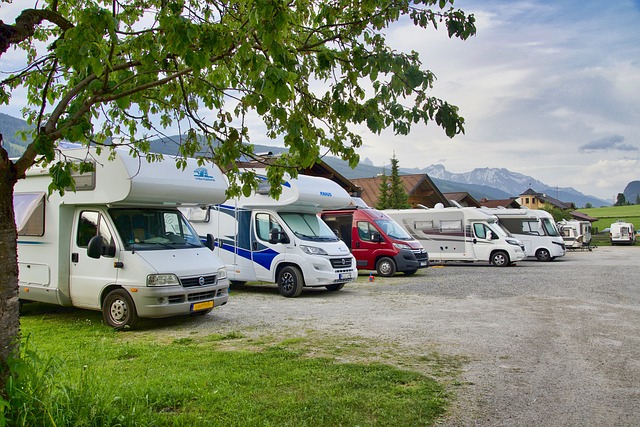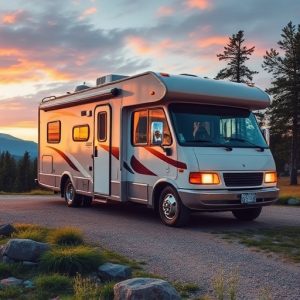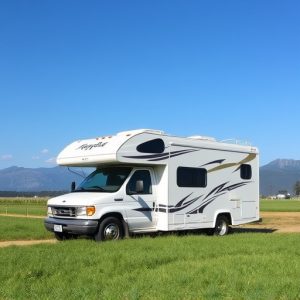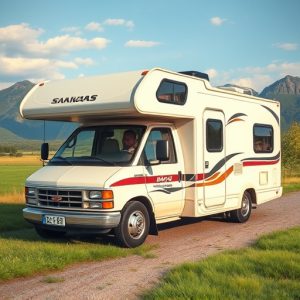Optimal RV Utilities: A Guide to Maximizing Energy and Water Efficiency for Enhanced RV Travel
RV travelers can optimize their trips by mastering energy management to maintain battery health and …….

RV travelers can optimize their trips by mastering energy management to maintain battery health and maximize power efficiency. It's crucial to understand your RV's energy sources, particularly deep-cycle batteries, and to disconnect non-essential appliances when not in use. Utilizing solar panels or generators judiciously can replenish your battery reserves without overtaxing them, especially during extended off-grid stays. Upgrading to LED lighting and Energy Star rated appliances helps conserve energy, as does using a smart power converter and battery charger for efficient charging. Regularly checking battery levels with a multimeter allows for informed adjustments in energy use, extending the lifespan of your batteries and ensuring a comfortable travel experience.
Equally important is managing your RV's water system to maintain hygiene and efficiency. Knowing the components—from freshwater tanks to wastewater holding tanks—is vital, as is performing regular maintenance, prompt repairs, and pre-trip inspections of hoses to prevent contamination and leaks. Before travel, especially in colder regions, it's essential to flush the system to remove stagnant water and sediments, and to winterize it to prevent freeze-ups. Using a high-quality water filter improves the taste and safety of your drinking water by removing impurities. Adhering to these RV travel tips ensures a reliable water supply and enhances overall trip comfort and convenience, making your RV journey safer and more enjoyable. Effective energy and water system management are integral parts of successful RV travel, contributing to a smooth and memorable experience on the road.
Managing an RV’s utilities and systems is a balancing act that seasoned travelers master with time. This comprehensive guide delves into optimizing your recreational vehicle’s performance, ensuring you navigate the challenges of energy management, water supply, climate control, waste handling, and propane usage efficiently. From strategic solar panel use to understanding your electrical system, maintaining appliances, and conserving water, these RV travel tips are tailored to enhance your comfort, safety, and environmental footprint while on the road. Learn to adapt your systems to seasonal climates, insulate effectively, and perform regular checks to keep everything running smoothly. Whether you’re a full-timer or a weekend warrior, this article equips you with the knowledge to manage your RV’s complex systems with confidence and ease.
- Efficient Energy Management: Maximizing Your RV's Battery Life and Power Usage
- Mastering Water Systems: Ensuring Clean, Safe, and Efficient Water Supply in Your RV
Efficient Energy Management: Maximizing Your RV's Battery Life and Power Usage

When embarking on an RV travel adventure, mastering efficient energy management is crucial for maximizing your battery life and optimizing power usage. To ensure your RV’s batteries are in top shape throughout your journey, it’s imperative to understand the behavior of your energy sources and storage systems. Deep-cycle batteries, typically used in RVs, have a finite capacity that can be extended with careful management. Disconnect non-essential appliances when not in use, as these can draw power even when not active. Utilize solar panels or generators judiciously to supplement your battery power without overtaxing them. By doing so, you’ll minimize the strain on your batteries and reduce the likelihood of depletion during critical moments, such as overnight or in remote locations.
In addition to conserving battery life, it’s essential to monitor and regulate your energy consumption. Invest in energy-efficient LED lighting and consider energy-star rated appliances for your RV. Use a smart power converter and battery charger to ensure that your batteries are charging correctly and efficiently. Regularly check your battery levels with a multimeter, and adjust your usage accordingly. By adopting these RV travel tips, you’ll not only enhance the longevity of your batteries but also enjoy uninterrupted comfort during your travels. Smart energy management can transform your RV experience from good to great, allowing you to explore new horizons with confidence and ease.
Mastering Water Systems: Ensuring Clean, Safe, and Efficient Water Supply in Your RV

When embarking on RV travel, mastering your RV’s water systems is crucial for maintaining a clean, safe, and efficient water supply. To ensure that your RV’s water system functions optimally, it’s essential to understand the different components of the system. This includes the freshwater tank, water pump, filter, and faucets, as well as the wastewater holding tanks and drain lines. Regular maintenance and timely repairs are key to preventing contamination and leaks. Before any trip, inspect all hoses for signs of wear or damage, and test your water system by running water through each fixture to check for proper operation. RV travel tips recommend flushing the system before and after filling your freshwater tank to remove any stagnant water and sediments that may have accumulated over time. Additionally, using a good quality water filter can enhance the taste and safety of your drinking water while removing impurities. It’s also wise to winterize your RV’s water system if you’re traveling in colder regions to prevent freeze-ups and damage to the pipes. By staying proactive with maintenance and understanding how to use your RV’s water systems effectively, you can ensure a continuous supply of fresh, potable water throughout your journey, making every aspect of your RV travel experience more enjoyable and hassle-free. Implementing these RV travel tips will help you maintain the integrity of your water system, contributing to a healthier and more pleasant adventure on the road.
Optimizing your RV’s utilities and systems is key to ensuring a comfortable and efficient travel experience. By implementing the energy management strategies detailed in this article, RVers can extend their battery life and conserve power, which is essential for off-grid adventures. Similarly, understanding how to master your RV’s water systems will guarantee a clean, safe, and efficient water supply, whether you’re boondocking or connected to municipal services. With these RV travel tips in mind, you can confidently embark on your journeys, knowing that you have the tools to manage your rig’s essential functions effectively. Happy travels!







